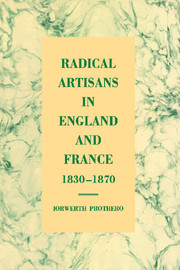Book contents
- Frontmatter
- Contents
- Acknowledgements
- List of abbreviations
- Introduction
- 1 Artisans
- 2 Radicalisms
- 3 Trade unionism
- 4 Work and radicalism
- 5 Socialism
- 6 Co-operation
- 7 Class and radicalism
- 8 Political action and organisation
- 9 Education and civilisation
- 10 Religions and philosophy
- 11 The culture of radical clubs
- Conclusion
- Notes
- Select bibliography
- Index
11 - The culture of radical clubs
Published online by Cambridge University Press: 24 November 2009
- Frontmatter
- Contents
- Acknowledgements
- List of abbreviations
- Introduction
- 1 Artisans
- 2 Radicalisms
- 3 Trade unionism
- 4 Work and radicalism
- 5 Socialism
- 6 Co-operation
- 7 Class and radicalism
- 8 Political action and organisation
- 9 Education and civilisation
- 10 Religions and philosophy
- 11 The culture of radical clubs
- Conclusion
- Notes
- Select bibliography
- Index
Summary
Radical political activity among artisans cannot be separated from other aspects of their lives. As in the French Revolution, it faced the rival demands of work, home, and pleasure-seeking at the cabaret, so that often, as Cobb said, ‘billiards and women had the final say’. Radicals thus competed with aspects of popular culture. Yet mobilisation is more successful if it builds on existing social relationships, shared structures of communication, and routine interaction, the community ties built up by social intercourse and conversation. Radicalism could thus be based on groupings existing in often very localised areas of social exchange and sociability. Work was one such location and basis for radicalism, and, as a commentator in Birmingham noted, ‘the manufactories, my friends, have their politicians and republicans as well as the barber-shops and alehouses’. But, as Corbon remarked, ‘daily labour is therefore for our working man merely the forced labour imposed each day; and having generally no serious or lasting love for his labour at all, he only devotes to it the smallest portion of his intellectual weight’, and he stressed, behind the apparent resignation of the working population, ‘a devouring need for an outside life’, ‘this great and legitimate need of an outside life that characterises the Paris working man’, which he saw expressed in an interest in novels, theatre, drinking places, gaming, easy women, and political events. Dunning stressed how trade union newspapers always failed, because the working classes wished to read not about matters relating to working men but for amusement, to get as far away as possible from their daily toil, and his Bookbinders' Trade Circular only survived through subscriptions, including those of non-working people.
- Type
- Chapter
- Information
- Radical Artisans in England and France, 1830–1870 , pp. 281 - 311Publisher: Cambridge University PressPrint publication year: 1997



